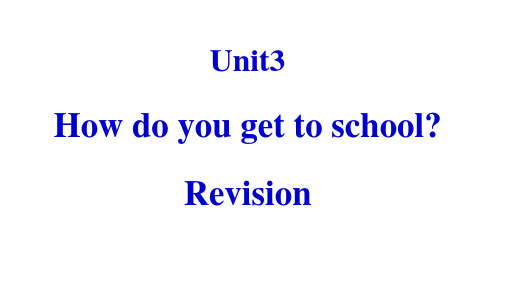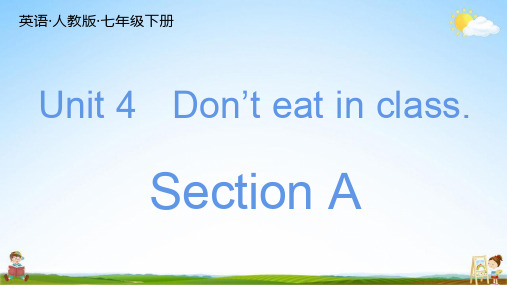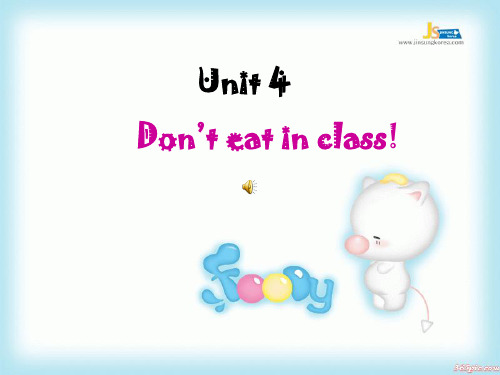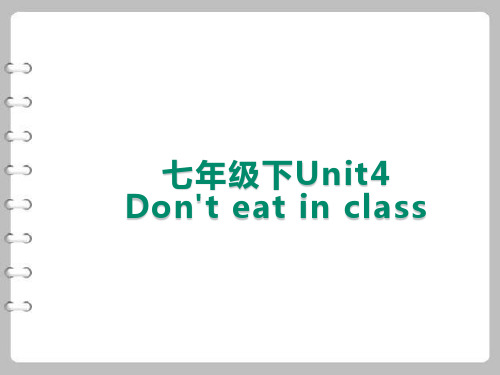新人教版英语七年级下册Unit4-总复习课件
人教版七年级下册英语unit4单元全套课件

➢ 中考链接
【2019·江苏宿迁】 — __D_o_n_’_t_m__a_k_e_ (not make) a mess on
the balcony, Betty. — Sorry, I won’t.
【2019·四川南充】
— Mum, may I play computer games
Ⅱ.组句。
1. late, don't, for school, arrive Don’t arrive late for school.
2. music, listen to, in the classroom, don't Don’t listen to music in the classroom.
Children like to listen to music. 孩子们喜欢听音乐。 3) sound“听起来”, 它是系动词,后面 接形容词等。例如: That sounds great. 那听起来真不错。 It sounds like fun. 听起来挺有趣。
3. fight 打架,争吵
1) 作动词用: Jack never fights with his brother. 杰克从不和他的弟弟打架。
1) listen 听;用来提醒某人注意,后面不跟事物。 Listen! Who’s singing in the classroom? 听!谁在教室里唱歌?
2) 如果后面跟要听的事物,应跟介词to再跟事物。 Listen to our teacher carefully. 认真听老师讲。
hear, listen和sound都有“听”的意思, 但三者是有区别的。 1) hear “听说” , 侧重于“听” 的内容。例如:
Unit3+-Unit4+复习课件 人教版七年级英语下册

1.-How do you usually go to school?
-By ___C__bike, but sometimes I take ______bus.
A.a; / B. a; the C. /; the D. /; /
归纳2:提问时间
H__o_w__l_o_n_g_ + does it take sb. to do sth.?句型 How long does it take you to go to school?
Unit3
How do you get to school? Revision
revision
--How do you get to school? --I ride my bike.
ห้องสมุดไป่ตู้
Way
--How long does it take to get to school? --It takes about 20 minutes.
1.It takes Rose about twenty minutes ___C____ to school by bus. A.get B. gets C. to get D. getting 2.It takes ___B__ 25 minutes ________his homework. A. him; to doing B. him; to do C. his; to do D. his; doing
walk to … to
1.到达学校/ 到家 2.在...和...之间 3.他们的梦想成为现实 4.害怕(做)某事 5.某人花费时间做某事 6.步行去…… 7.一个11岁的男孩 8.认为,想起 9.乘铁索过河 10.他对我来说像一位父亲一样 11.骑自行车到学校 12.离学校大约十公里远 13.你觉得怎么样 ? 14.到达学校很容易 15.步行/骑行15分钟的路程
unit 4【复习课件】七年级英语下册单元复习(人教版)

10. I can’t relax on weekends __e_it_h_e_r___ _b_e_c_a_u_se___ I have to
learn to play the piano. 周末我也不能放松, 因为我不得不去学习弹钢琴。
重点语法
祈使句
用于表达命令、请求、劝告、警告、禁止等的句子称为 祈使句。祈使句最常用于表达命令。祈使句因对象(即主语) 是第二人称, 所以通常省略主语而以动词原形开头。祈使句句 末使用句号或感叹号。为表示语气委婉, 可在句首或句尾加 please, please放在句尾时, 前面通常加逗号。
Let me help you. 让我来帮你。
重点语法
祈使句
考题:[ 广元] —________ silent, please! You are in the library.
—I’m sorry, madam.
A. Keep
B. To keep
C. Keeping
D. Kept
重点语法
祈使句
否定祈使句的形式:
重点单词
1. rule n. 规则; 规章→____s_c_h_o_o_l_r_u_le_s___学校规则 2. arrive v. 到达→ ___a_r_r_iv_e__in_/_a_t._..__到达……
→ar_r_i_v_e_l_a_te__fo_r__sc_h上oo学l 迟到 3. fight v.& n. 打架; 战斗→ __f_ig_h__t _a_g_a_in_s_t_s_b_.和某人打斗→
→_____fo_l_lo_w__in_g____n. 下列事物
重点单词
30. learn v. 学习; 学会→ _le_a_r_n__to__d_o_s_t_h_.____学习做某事 → ____l_ea_r_n__fr_o_m__s_b_.向某人学习 → ____l_e_a_rn__a_b_o_u_t了解; 获悉
人教版七年级英语下册 Unit 4 期末复习 练习题教学课件PPT初一公开课

英语·人教版·七年级下册Unit 4 Don’t eat in class.Section A一、词汇运用(A)根据汉语或首字母提示写出单词1.[2021四川乐山中考]There is a new (规则)to make sure that you don’t waste food.2. You can’t play in the library, but you can play (在外面).3.It’s very (重要的) to make a plan before we do everything.4.[2020广州中考]It’s a general rule to keep q in libraries and concerts.1.rule 句意:有一条新规定,确保你不浪费食物。
rule"规则",是可数名词,空前有a修饰,应用其单数形式。
2.outside 句意:你不能在图书馆里玩,但你能在外面玩。
3.important 句意:在我们做所有事情之前制订计划是非常重要的。
表示"重要的",用 important。
4.quiet 句意:一般来说,在图书馆和音乐会要保持安静。
keep quiet意为"保持安静"。
5.I usually l to some sweet music to help me relax after a day’s work at school.6.Mark a at the office on time every day. He is never late.7.[2021山东泰安中考]The students will put on a new play about f against COVID- 19 tomorrow evening.5.listen 句意:在一天的课程后,我通常会听一些甜美的音乐来帮助我放松。
Unit4复习课件英语七年级下册

turn on open
打开;接通(电源等) 打开;敞开
通常指打开水龙头、电灯、 电视等电器开关,其对应 的短语是turn off
通常指把关着或封闭的门 窗、箱子、盒子等打开, 其对应词是close
Open the door and turn on all the lights 打开门,并打开所有的灯。
good things people enjoy in life.
16.感恩节晚餐的主菜几乎通常是火鸡。 The main dish of Thanksgiving dinner is almost always turkey.
1.Cut up 切碎 “动词+副词”型短语,名词作宾语时,置于副词前后均可, 如cut up a tomato ;cut a tomato up 但代词要置于动词和副词之间并且用宾格,如:cut it up cut them up 拓展:
1.Please put two teaspoons of salt into the water , and then _______. A mix up it B mix it up C mix up them 2.Don’t mix ______ until I pour the milk ______ the blender. A.up them; into B them up; into C up them ; in 3.The apple is too big. You can ______ first. A. mix it up B. cut it up C. cut up it 4.Don’t _____ so often. It’s bad for your health. A.get up B stay up C look up
人教版英语七年级下册Unit4PPT课件

3:remember doing sth记得做过某事(做了)
如: I remember taking a desk to Tom
我记得已经拿给Tom了(已经做过了)
Do you remember __jion my party tomorrow,Alice
I can remember __your party last month.
3: learn from 向。。。学习
如:You should learn from Bob
你应该向Bob学习
4:learn about 学习什么 ,了解什么
如:I want to learn about history
2021/7/23
33
1. have fun玩的开心--have great fun玩的很开心 如:We always have great fun at parties 我们在聚会上总是玩的很开心
2.feel系动词----感受,觉得
feel sb do sth 感到某人做某事}这件事情已经发 生了
feel sth do sth感到某物做某事}这件事情已经发 生了
如:I felt a cat eat my food.(食物已经被吃了)
2021/7/23
25
1. feel sb/sth doing sth感到某人/某物正在做某 事(现在正在做的事情)
:
2:lucky(形容词)幸运的 You are lucky你是幸运的
3:unlucky(形容词)不幸运的
2021/7/23
30
1. keep (v) 使....保持
keep sb /sth +形容词/介词短语
表示:某人或某物保持某个状态
人教版英语七年级下Unit4 学习课件

小测试
“_______ play basketball in the hallways!” Our teacher says to
us.
A. Not
B. No
C. Doesn’t
D. Don’t
小测试
Mrs. Smith says to Tom,"_____ get up too late." A. Doesn't B. Can't C. Don't D. No
小测试
—_________ run in the hallways. —Sorry. A. Please B. Do C. Don't D. Does
2.Don’t listen to music in class.
Listen:不及物动词,后接宾语+to(听的动作)
Listen to+名词/代词 Everyone is listening to the teacher carefully. Listen to sb do/doing sth
-- _______ .
A. No, I don't.
B. No, I won't.
C. Yes, Ido.
D. Yes, I would
2.--Don't keep water running when you wash hands.
-- ______.
A. I hope so.
B. I'm afraid not.
Have to:必须,不得不
There are no buses and he has to go home on foot. The old man looks young.
人教版英语七年级下册 Unit 4 单元巩固与复习 课件(共25张PPT)

句型分析 1. Don’t arrive late for class. 1)这是一个表示否定的祈使句,祈使句表示请求、命令或者建议。 谓语动词用原形,句子的主语you通常省略。 句子结尾用句号,表示强烈语气的时候用感叹号, 朗读时要用降调。 可以在句末或者句首加上please, 使语气更加的缓和客气。 please 放在句首时后面不需要加逗号,放在句末时后面要加逗号。 例如:Listen to your teacher, please. 请听你的老师讲话。
Clark [kla:k]克拉克(姓;男名) Amy [eɪmɪ]埃米(女名) Molly['mɒlɪ]莫莉(女名) New York [nju: jɔ:k]纽约 arrive [ə'raɪv]v.到达 wear [weə]v.穿;戴 bring [brɪŋ]v.带来;取来 listen ['lɪs(ə)n]v.听;倾听 relax [rɪ'læks]v.放松;休息
have to 不得不have to 得不be quiet 安静
be quiet 安静
make breakfast 做早饭 make breakfast 做早饭
be noisy 吵闹
be noisy 吵闹
keep one’s hair short 留短ke发ep one’s hair short 留 play with sb. 和某人一起短玩发 play the piano 弹钢琴 play with sb. 和某人一
Don’t look out of the window. 不要向窗外看。 Please come in. = Come in, please. 请进。
- 1、下载文档前请自行甄别文档内容的完整性,平台不提供额外的编辑、内容补充、找答案等附加服务。
- 2、"仅部分预览"的文档,不可在线预览部分如存在完整性等问题,可反馈申请退款(可完整预览的文档不适用该条件!)。
- 3、如文档侵犯您的权益,请联系客服反馈,我们会尽快为您处理(人工客服工作时间:9:00-18:30)。
A. take
B.bring
C.give
3. It's raining, so we ___D___ stay at home.
词汇训练营
快速回忆所学单词,看谁说得又快又准!
9. 重要的 adj. ___im__p_o_r_t_a_n_t __
10. 安静的 adj. ___q_u_i_e_t__
11. 练习 v.; n. _p_r_a_c_t_ic_e_
12. 脏的 adj. ___d_ir_t_y____
反义词:clean
4. There are too many rules! 有太多的规定! too many “太多的”,中心词是many,修饰可数名词复数。 too much“太多的”,中心词是much,修饰不可数名词。 much too “太,非常”,中心词是too,修饰形容词或副词。 5. Parents and schools are sometimes strict. 父母和学校有时 是严格的。 be strict with sb. 对某人要求严格。
keep及物动词,意为“保持”,“keep+名词+形容词”指保持 某种状态。
句型大闯关
“学以致用”,你真的会用了吗?
句型转换。 1. 他开会总是迟到。 He __i_s___ always __l_a_t_e_ __f_o_r_ meeting. 2. 请准时! Please __b_e___ __o_n___ _t_i_m_e___! 3. 我觉得我家的约束太多了。 I think I have __t_o_o___ __m_a_n_y__ rules in my house. 4. 你什么时候到达北京的? When did you ___a_rr_i_v_e __i_n___ Beijing?
句型大闯关
本单元重点句子有哪些?看谁说得多!
6. And we always have to wear the school uniform. 并且我们总 是不得不穿校服。 1)have to“不得不”,后面接动词原形,表示客观上要做的 事。 2)wear“穿着”,强调穿的状态;put on强调穿的动作。 7. ….I have to/must keep my hair short.我必须留短发。
句型大闯关
句型大闯关
本单元重点句子有哪些?看谁说得多!
1. Don’t arrive late for class.不要上课迟到。 1) 此句是祈使句的否定形式。 2) arrive in +大地方; arrive at + 小地方 3) be late for … 2. We must be on time. 我们必须守时。
初中英语人教版七年级下册
Unit 4 总复习课件
内容大纲
1
词汇训练营
2
句型大闯关
3
语法加油站
词汇训练营
词汇训练营
快速回忆所学单词,看谁说得又快又准!
一、快速说出下列单词或短语。
1. 规则 n. __r_u_l_e___
2. 到达 v. ___a_r_r_iv_e__
3. 大厅 n. ___h__a_ll__
follow the rules 遵循规则
词汇训练营
单词填空,考查综合运用能力!
二、根据首字母或汉语提示填空。
1. We have a lot of r ules in our school. 2. Ms. Green never arrives (到达) late for work. 3. Come in. It’s cold o utside . 4. I think it’s __im__p_o_r_t_a_n_t__ (重要的) to learn English well. 5. We have to wear (穿) sports shoes for P.E. classes. 6. He is _le_a_r_n_i_n_g(学习)to play the piano. 7. You must remember __t_o_c_le_a_n__ (clean) the classroom.
句型大闯关
Байду номын сангаас
“学以致用”,你真的会用了吗?
单项选择。
1. —Can you cook fish?
— _B___. It’s easy.
A.No, I can’t
B. Yes, I can
C. Sorry, I can’t
D. Yes, I need
2. Please ___B__ some books here for me.
1)情态动词can在本句中表示请求,意为“可以”。其一般 疑问句形式为“Can+主语+动词原形+其他?”;肯定回答用 “Yes,…can.”否定回答用”Yes,…can.”否定回答用 “No,…can’t.” 2) bring 动词,意为“带来,取来”。
句型大闯关
本单元重点句子有哪些?看谁说得多!
•可怕的;非常讨厌的 adj. ___t_e_r_ri_ble
•头发 n. ____h_a_i_r__ •记得;记住 v. ____r_e_m__e_m_b__er •遵循;跟随 v. _____f_o_l_lo_w • 学习;学会 n. ____le_a_r_n
remember to do sth. 记得去做某事 remember doing sth. 记得做过某事
dining hall 餐厅
4. 打架;战斗 v. ___fi_g_h_t___ fight with sb.
5. 在外面 adv.;外面的 adj. __o_u_ts_i_d_e__
6. 穿;戴 v. ___w__e_a_r__
7. 听 ___l_is_t_e_n_t_o__
8. 铺床 _m__a_k_e_o_n__e’_s_b_e_d__
1)must 作为情态动词,表示“必须”、“务必”,有时 还表示“一定”,起到加强语气的作用。 2) on time 是一个固定介词短语,表示“按时;准时”。
句型大闯关
本单元重点句子有哪些?看谁说得多!
3. Can we bring music players to school?我们可以带音乐播 放器到学校吗?
